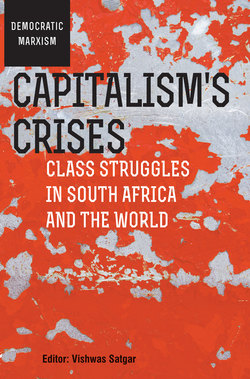Читать книгу Capitalism’s Crises - Alfredo Saad-Filho - Страница 14
На сайте Литреса книга снята с продажи.
CHAPTER 1: FROM MARX TO THE SYSTEMIC CRISES OF CAPITALIST CIVILISATION
ОглавлениеVishwas Satgar
Over the past two centuries, crisis has been endemic to capitalism. Yet classical and neoclassical economics has tended to treat crisis more as an aberration to ‘the norm’ of a stable self-regulating market. Since the onset of the 2007/08 global crisis, however, this axiomatic truth of capitalist economics has been called into question. The 2007/08 crisis is ongoing and has been compared to the general crisis of the Great Depression (1929–1941). It is now considered one of the worst crises in the history of modern capitalism, having eclipsed the Great Depression. So, how do we characterise the nature of the contemporary capitalist crisis? Are we experiencing a cyclical crisis or a deeper systemic crisis? Are we living through a time of periodic and general crises? Given the scale and depth of the contemporary crisis, which poses major existential threats to planetary life, this chapter argues that we are dealing with an unprecedented civilisational crisis with multiple systemic dimensions: the systemic crises of capitalist civilisation.
I situate the argument in the context of Marx’s conceptions of capitalist crisis. Marx’s understanding of capitalism, as a body of knowledge and with its valuable contribution to modern social thought, has not been surpassed. However, in engaging Marx it is necessary to appreciate that classical theory on capitalist crisis, originating with Marx, is at an impasse in terms of comprehending the contemporary systemic crises of capitalist civilisation. The critical engagement with Marx is not about refuting his corpus, however, but about seeking new openings and ways of thinking about the contemporary capitalist crisis. It is about finding theoretical space in Marx’s understanding of the ‘deep structures of capital’ for the notion of the ‘systemic crisis of capitalist civilisation’ and other conjoined concepts, such as ‘capital as a geological force’. This is grounded in an appreciation that Marx’s work is unfinished and open to development by deploying his own dialectical method of thinking.
Also significant in this search for new openings and ways of thinking about capitalist crisis is the challenge of the level and scale at which we think about this crisis. To merely think about crisis in the abstract, at the level of the ‘deep structures of capital’, is not very useful in itself. Similarly, to think about the crises of capitalism as merely economic crises is wholly inadequate. Therefore, I argue that abstractions and economic reductionism do not help us come to terms with the level and scale of the crises of contemporary capitalist civilisation. This approach relates directly to the challenge of how we periodise historical capitalism to bring out its historical specificity. This chapter therefore advances a perspective on the historical development of capitalist civilisation and its periodisation at a historical level and as a global social system.
Finally, in this chapter I show how the various systemic dimensions of capitalist crisis can be understood in a non-reductionist way. This brings to the fore the role of the US-led bloc and transnational capital in both constituting and reproducing the systemic dimensions of capitalist civilisational crisis. In this regard, attention is given to the making and operations of the following systemic-crisis tendencies: financialised chaos, the climate crisis, peak oil, the food-system crisis and the securitisation of democracy. These dimensions of the systemic crisis relate to the challenge of left agency today and lead to the crucial question: is left politics about catastrophism or about the politics of a transformative moment?
In summary, the notion of the systemic crises of capitalist civilisation is essentially a thesis, which is tested in this chapter in relation to, firstly, Marx’s theoretical understanding of crisis; secondly, the challenge of providing a non-teleological but stages view of capitalism’s history, which captures the scale and depth of the crisis; thirdly, the empirical dimensions of the systemic crises of capitalist civilisation; and, finally, the challenges for left agency. The purpose of this approach is to open up new ways of thinking about capitalist crisis, while thinking about how the crises of capitalist civilisation prompt a rethink of left agency. At the same time, this analysis lays the basis for more in-depth theoretical and analytical work.
